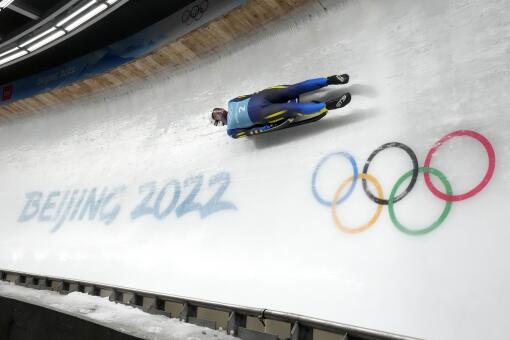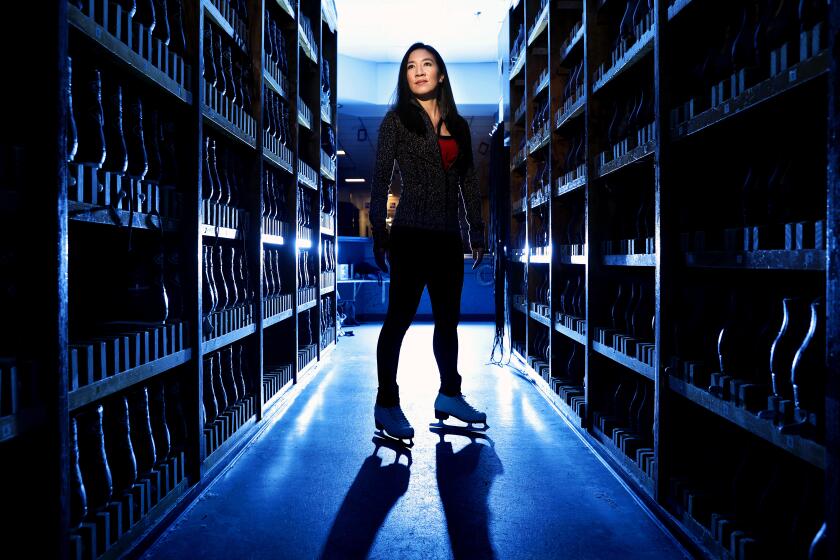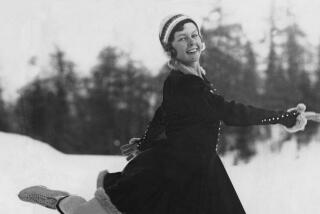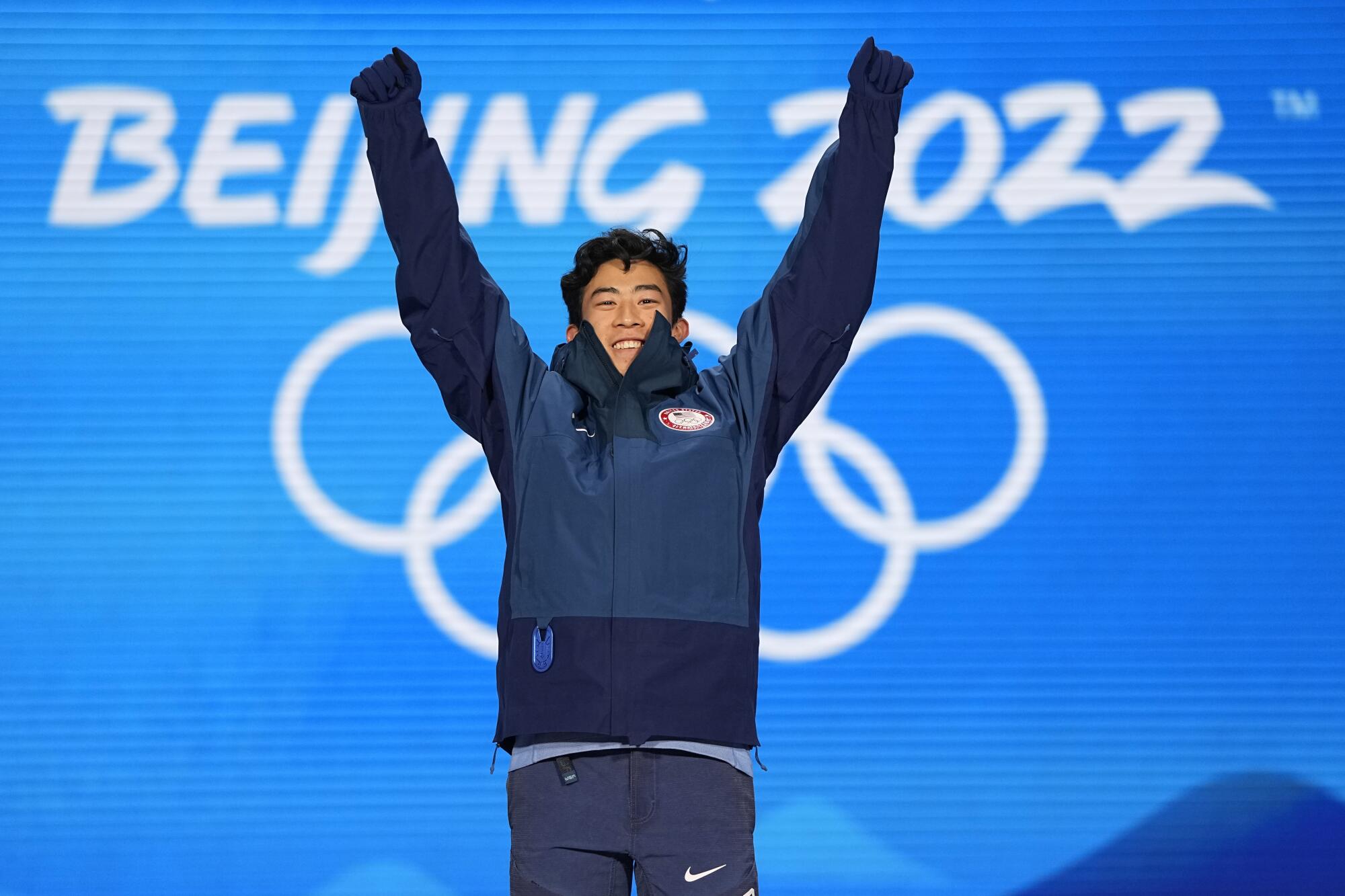
- Share via
BEIJING — Nathan Chen’s figure skating talent was apparent at a precocious age, surfacing quickly after he followed his hockey-playing older brothers out to the ice and realized he enjoyed the tickling breeze on his face and the problem-solving satisfaction of conquering a tricky jump or intricate spin. His resolve was obvious at an early age, too, never wavering despite his occasional bruised knee or bruised ego.
That unshakable sense of purpose was a key reason he commanded the ice this week and became an Olympic champion, the seventh American man to win an Olympic singles figure skating gold medal. It was the eighth gold medal won by American male singles skaters, including those that Dick Button won in 1948 and 1952. In addition, seven American women have won Olympic singles gold medals.
Clearly, Chen is in rare and exalted company.
“I actually didn’t know it was that few. That’s amazing,” he said on Thursday, after he landed five quadruple jumps in his Elton John-themed free skate performance and defeated Yuma Kagiyama of Japan by a staggering 332.60 points to 310.05.
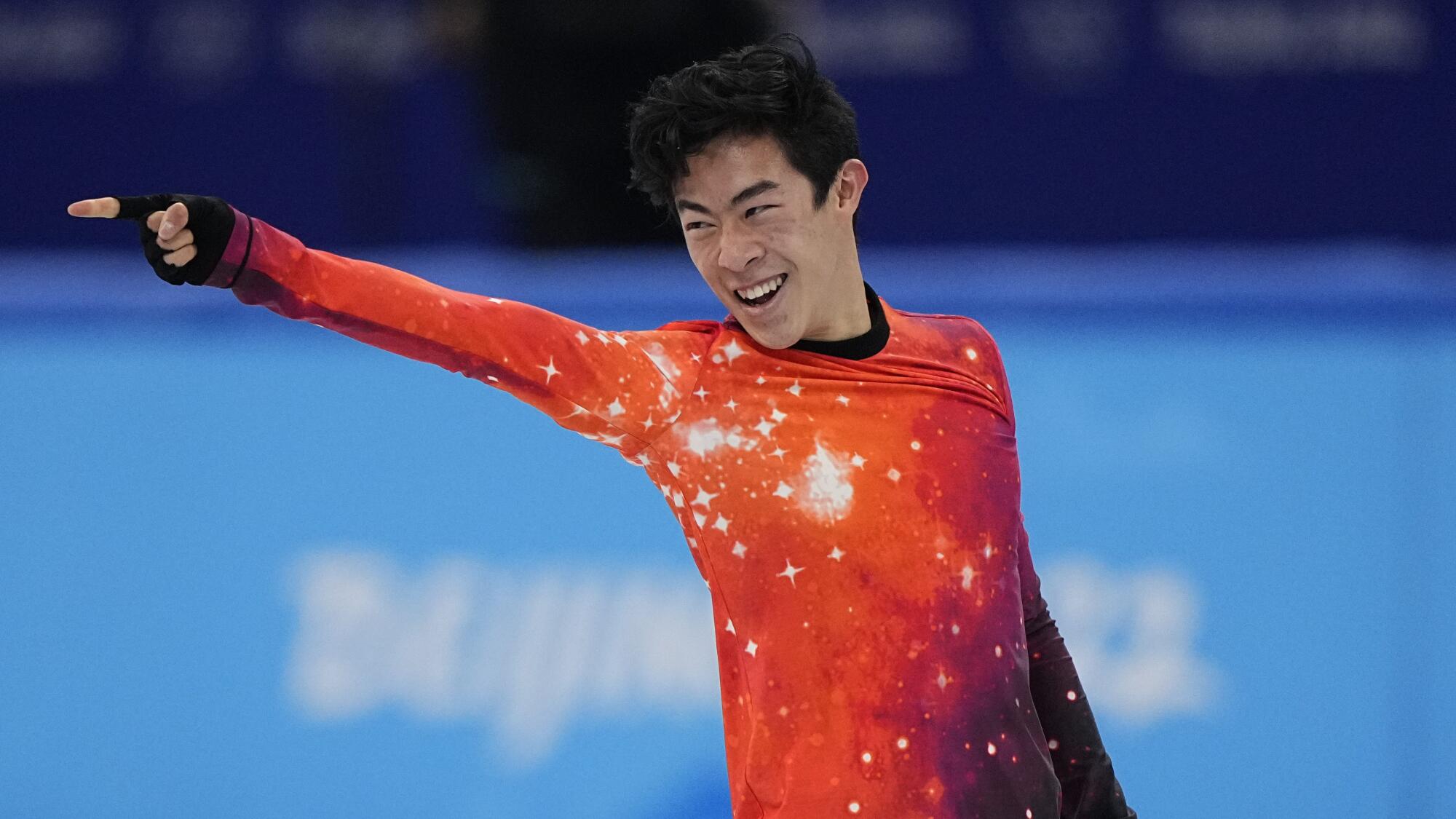
“I don’t really have too many words for that. Just so thrilled,” Chen said. “I can’t believe this happened, honestly.”
Shoma Uno of Japan, the 2018 Olympic silver medalist, won bronze here with 293.00 points. Yuzuru Hanyu, who became an idol in Japan while winning two straight Olympic titles and was expected to battle Chen for supremacy, narrowly missed his brave attempt to become the first skater to land a quadruple axel jump and finished fourth with 283.21 points.
Chen ended Hanyu’s reign with emphatic wins in both phases of the competition. To Jason Brown, who became the only other American male singles entrant after Vincent Zhou tested positive for the coronavirus and withdrew before the event, Chen’s excellence was no surprise.
“I’m just so proud of him. No one deserves it more,” said Brown, who finished sixth without any quadruple jumps but with an appealing display of artistry. “I’ve been competing alongside him for over a decade. He just is like no one else.”
Nathan Chen, a three-time world champion, added Beijing Olympic gold to his impressive list of accomplishments with a stunning free skate program.
Chen’s energetic fist pump after his “La Boheme” short program expelled the last lingering sour memories of his stumbles in the short program at the 2018 Pyeongchang Olympics, which kept him out of medal contention. He rose from 17th place to fifth and wondered if he’d get another chance at Olympic gold.
He was much better prepared when that chance came. With three world championships to his credit, the wisdom of experience and the aid of a sports psychologist he began seeing about a year ago, Chen approached the Beijing Games with optimism, not the dread he felt four years ago. His confidence got an additional boost during the first week in Beijing when he performed an excellent short program that helped the U.S. win a silver medal in the team competition.
The ghosts were gone.
“I saw him in 2018 and then I saw him this season and he’s just a completely different person now,” said U.S. women’s champion Mariah Bell, who trains with Chen at Great Park Ice in Irvine and became a trusted part of his support system during the COVID-19 pandemic.
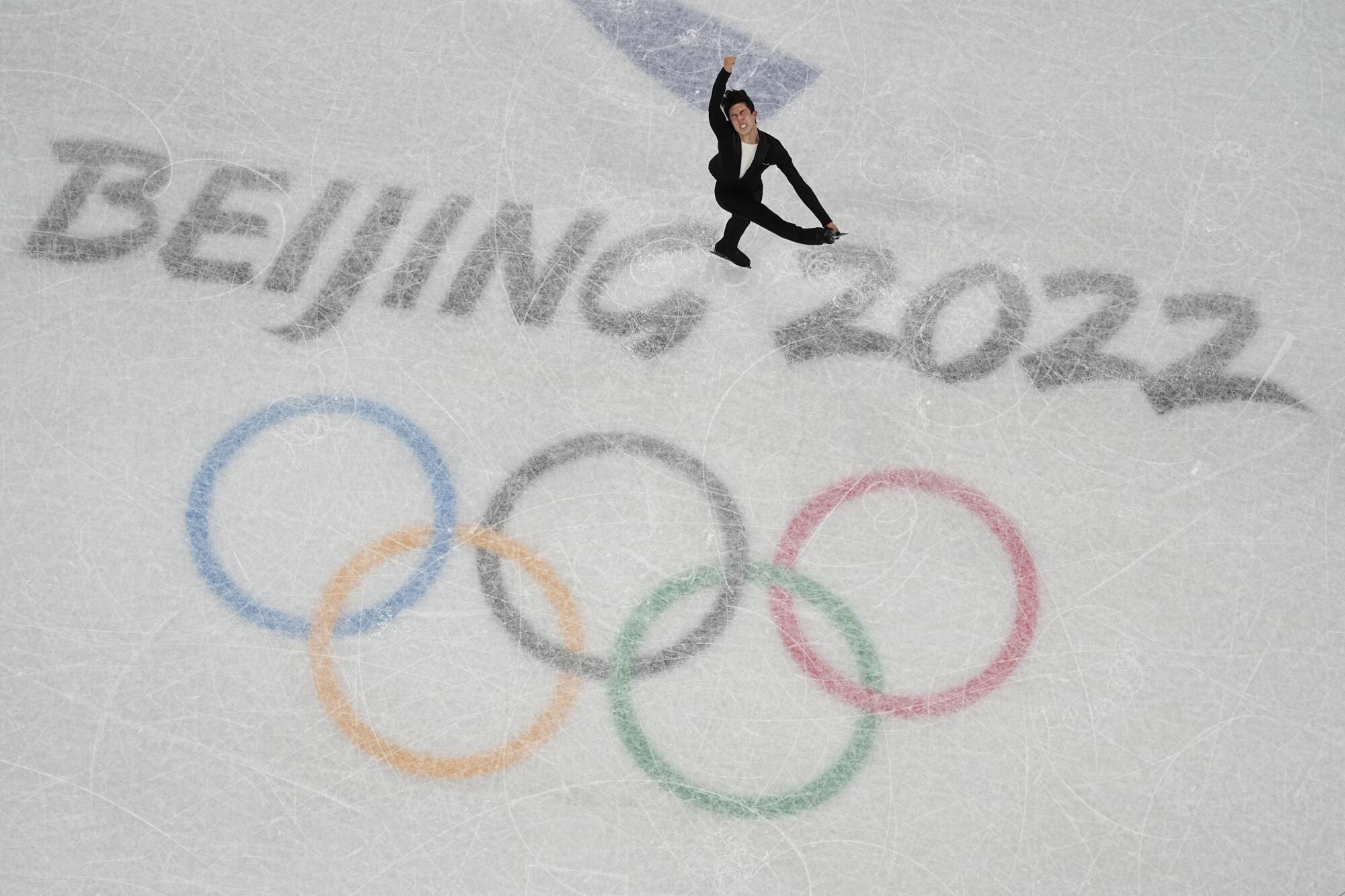
“I think probably the people around him were more nervous than he was,” said Bell, who was too anxious to sit while Chen skated on Thursday and was jumping up and down for joy long after he left the ice. “I don’t want to put words in his mouth but obviously he was carrying the weight of the world. But he handled it so well. He deserves to be Olympic champion because few people can handle it.”
Without a little help, Chen’s dreams might have withered before they could blossom.
Figure skating is an expensive sport, and his immigrant parents, Beijing-born Hetty Wang and Zhidong Chen, didn’t have a lot of money to spend on skates, lessons and competition costumes for the baby of their five children.
They tried to support him as best they could. For a while, that meant Hetty drove Nathan from the family’s home in Salt Lake City to Lake Arrowhead several times a year so he could work on his skills with renowned coach Rafael Arutyunyan. Hetty and Nathan would live in their car.
“Obviously he was carrying the weight of the world. But he handled it so well. He deserves to be Olympic champion because few people can handle it.”
— U.S. women’s champion Mariah Bell
“And then one day he said, ‘Mom, if we do not move I will not make it.’ Eleven year old boy,” Arutyunyan said, his tone tinged with admiration. “Then I knew it’s a chance.”
Still, the bills were piling up. Arutyunyan, himself an immigrant — he was born in the Soviet republic of Georgia and lived in Russia before moving to the United States — couldn’t bear to let money hold Chen back from a potentially brilliant career.
“Mom was giving me money in this hand, and I would take it in this hand and give it back to him,” Arutyunyan said, lifting one palm and then the other.
Nathan sometimes gave the cash back to Arutunyan, stuffing it in his coach’s pocket before running away. Hetty didn’t tell her son every detail of the family’s sacrifices, but he sensed those sacrifices were substantial. He didn’t want to waste their investment in him and his future.
“She would just try to scrap together some dollars and try to pay Raf,” Chen said. “And Raf obviously knew about the situation and thanks to the kindness of his heart was able to continue taking me in, taking as much money as we could provide him.
“But then at a certain point he was like, ‘I don’t really need that. I just want to help you achieve the goals that you want,’ and I’m forever grateful for that support.”
Arutyunyan shrugged off praise for his altruism. “Why? Boy. Just a good boy,” he said. “I made enough money. You know money, how much money do you make? Everybody have his limits and I got enough money. I’m driving [a] Honda. I’m OK. I’m all right.”
Chen stuck with Arutyunyan as the coach moved to various rinks in California and landed at Great Park Ice when the facility opened in 2019. Chen took some time away to attend Yale but put his studies on hold to focus on the Olympics.
Arutyunyan said their collaboration works because he is honest. Chen said in a recent conversation it’s because Arutyunyan teaches skaters to be independent and not rely on him for everything.
“Which is honestly a little bit strange, but he teaches us how to be individual athletes, how we need to address our own careers, how we should take responsibility for our own careers,” Chen said. “I think the most important thing with that is that ultimately you’re on the ice, you’re by yourself. You’re not being held by the hand by your coach. Being able to be almost autonomous and know exactly what I need allows us as athletes to come to a competition and have confidence that we know what we’re doing.”
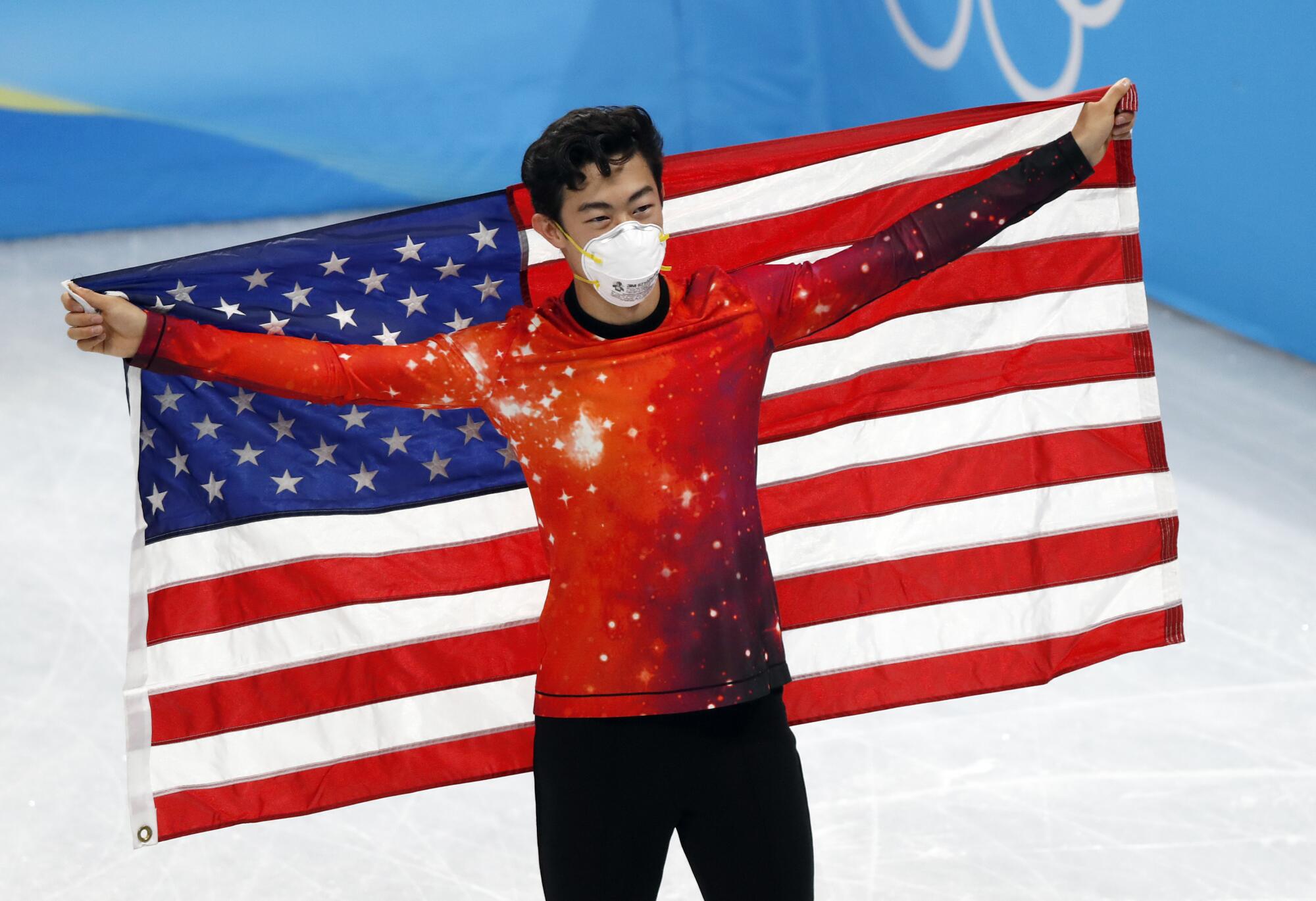
Chen also said he appreciates the comfortable atmosphere at the rink, which has drawn other elite international skaters. It’s also home to Americans Alexa Knierim and Brandon Frazier, who will compete in the pairs event.
“It’s nice to have training mates that are going through that alongside you,” Chen said. “Not everything is going to be perfect every single day and we know that. To have another training mate who’s like, ‘Hey, you look like you need a shoulder to cry on or a helping hand,’ we all see that and we can help each other out. And I think having that sort of positive atmosphere within the skaters and having someone demanding, having that guiding force, is a really positive way to continue growing.”
Chen’s success will give him a larger platform to inspire Asian skaters in the way he was inspired by seeing Michelle Kwan, who won nine U.S. championships, five world titles, and Olympic medals in 1998 (silver) and 2002 (bronze). Kwan, also a child of immigrants, briefly was coached by Arutyunyan.
Two-time Olympic medalist Michelle Kwan serves as an inspiration to Alysa Liu and the next generation of figure skaters.
“For me growing up in Salt Lake City and having a face like Michelle Kwan was really inspirational,” Chen said. “And I know that having athletes that look like you certainly gives you the hope that you can do the same, and Michelle Kwan certainly was that for me. If I can hopefully do something similar — of course I’ll never really reach Michelle Kwan stature, but just to be able to have someone like that when I was growing up was really powerful and that goes back to the power of representation right now.”
Chen’s lone regret was that his parents and siblings couldn’t be here because COVID restrictions imposed by Games organizers barred overseas visitors from entering China.
“My mom grew up in Beijing, so to even think that my mom as a young kid grew up in this location and now I’m here, in 2022, competing at the Olympics and skating the way that I did, it certainly means a lot to me,” he said. “And of course, my dad spent a lot of time in Beijing as well and met my mom here. It just means the world.”
Arutyunyan evoked Hetty’s presence when Chen, knowing he had clinched the gold, skated off the ice and went to the kiss-and-cry area to await his score. “As soon as I sat down, he was like, ‘Thank your mom on TV,’” Chen said.
In case he forgot, thanks, Nathan’s mom.
More to Read
Go beyond the scoreboard
Get the latest on L.A.'s teams in the daily Sports Report newsletter.
You may occasionally receive promotional content from the Los Angeles Times.


